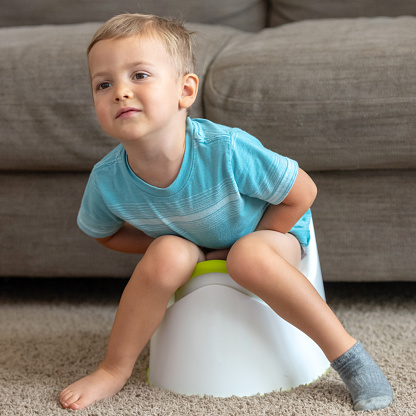Constipation is the difficulty in passing stools characterized by infrequent bowel movements. (1)
Experiencing occasional constipation is common. However, if it continues for several weeks or more, then it’s chronic constipation and should appeal to your attention. (2)
Your weekly bowel movements should not be fewer than three times. Up to 63 million people in the world suffer from chronic constipation. How will you know that you’re constipated?
Find here 9 signs and symptoms of constipation that should arouse you to seek medical advice or help you plan how to treat constipation
1. A feeling you haven’t completely emptied your poop
You have constipation whenever you leave the toilet and immediately feel the urge to poop again. Every time you go to the washroom, feel the release in your digestive tract and emptiness in your rectum. (3)
When you experience constipation, some stool lamps will leave the colon, but will not pass through the rectum.
The stools that are blocked here make the body feel like there is a need for bowel movements even after you are from the toilet.
2. A feeling of bloat and nauseous
Whenever you feel frequent pressure or fullness in your stomach, you are bloated. Bloating varies in feelings from mild to painful.
Nausea is irritation, retching, and gagging with a feeling of vomiting. Though nausea has many causes and underlying factors, where it comes with stomach bloating, then it’s a sign of constipation. (4)
3. Stomach ache or cramps

Abdominal pain is a common sign of constipation that comes in aches or cramps. Stomach cramps result from gas build-up in the abdomen and the need to pass stools. (5)
Mild pains without other signs of constipation outlined here need not cause concern.
Individuals who are having constipation often feel sharp gas pains in their abdominal areas. They are bloated and full, and their abdomen is distended sometimes. (6)
4. Stools are painful to pass
When the food moves through your colon slowly, much water is absorbed back into the body. The result is a parched stool, hard and also clumped together. (7,8)
During bowel movements, there is a feeling of pain around the anal section that is very severe because the stool is compacted and cannot slide easily like normal poop. (9)
In kids, you will hear them cry during passing stool.
5. Difficulty in passing stool
When the stool is too hard because of the slow colon movement, it becomes hard to have healthy bowel habits.
It even gets to the point you cannot move bowels despite the urge for bowel movements in a chronic state. Bulky stool becomes hard to push and hurts at the very moment.
6. The poop is dry and hard or lumpy
In most cases, the texture of a normal poop is soft and firm. It is also easy to pass during bowel movements. The color also should be brown.
If you experience changes in your poop, primarily in texture, for over two weeks, you are experiencing constipation. When you are constipated, much water is absorbed from the poop, making it hard and lumpy. (10)
7. Fewer than three bowel movements a week
Several health care specialists accord that healthy bowel movements range from thrice a day to three times a week.
Although there is no stipulated rule in the frequency of passing stool, less than three times a week is enough to cause an alarm.
When you realize you visit the toilets fewer than before and the stool has a hard texture and comes with difficulty, you are suffering from constipation.
8. A feeling of blockage in your rectum that prevents bowel movement
You release the stool with ease and comfort in normal bowel movement, unlike when constipated. For individuals suffering chronic constipation, there is a feeling of blockage that hinders the passage of the poop.
The rectum feels like a barrier that blocks the stool from passing out, and the hard stools result in the slow movement.
9. A Feeling to apply some force on your abdomen to have a bowel movement
Constipation also causes the need to use force to remove the poop. Because of the hardness of the stool and the blockage feeling on the abdomen, individuals suffering from constipation feel the need to exert extra pressure to rid the stool.
Symptoms of chronic constipation in children and toddlers

Though the symptoms are often across the board, there are specific signs of constipation in kids. These include:-
Large wide stools
Because of insufficient water intake, low dietary fiber, and decreased colon motility. Constipation causes this fecal impaction. This symptom is in both kids and adults.
Blood on the stool or toilet paper after poop
Due to the tender anal tissues of kids, the hard clumpy stool will often lead anal fissures on the rectum and anal opening, leading to bleeding. It’s advisable to see a doctor if this is the case.
Belly pain and bloating
Belly pain and bloating are symptoms in adults and kids, but the sign is more marked in a constipated child. It’s a sign of irritable bowel syndrome characterized by constipation.
The abdomen appears distended, and the kid often complains of stomachaches.
Spitting up in kids can also be assign of constipation
Spitting up in kids is the flow of stomach contents through the mouth of babies. It comes with burps. When this flow is forceful, vomiting occurs.
It occurs because of several factors in kids, but may also show constipation, especially if other symptoms mentioned above occur.
Restlessness
In most cases, children are slow to explain their problems. They show their concern through behavior. When your child becomes uncomfortable, often, and you have seen any of the above symptoms in them, the child might be suffering from constipation.
Using your hand to help exit stool
In severe bowel problems, the poop becomes too hard that the kid can’t pass it out. The stool movement can be too slow that some parents even use their fingers to remove the stool from the anal opening.
Though this is a rare phenomenon, it’s one indicator of chronic constipation that needs medical attention.
Decreased appetite
Decreased appetite is a symptom of many illnesses. It’s no surprise that it’s also among the symptoms of constipation.
It occurs when the individual suffering from constipation is bloated and filled with gas. When you are constipated and have pains and cramps in your lower abdomen, it will inevitably affect your eating.
Lethargy
Constipation often goes handy with fatigue. The lethargy comes from malnutrition caused by the long hold of toxic wastes in the large intestines.
The longer you hold the wastes within the body, the harder it is to absorb nutrients into the system.
Where do you feel constipation pain?
Constipation can cause tightness and pain in the abdominal area or deep digestive tract. They can also feel full all the time—like having eaten an entire meal—even after not eating for many days.
What effects does constipation have on the body?
When the stool doesn’t escape from our system, it accumulates around our digestive tract. The softer tissue binds to it during this stage, obstructing the flow.
The pressure on the colon used to remove food from your mouth can not move the stool because it is large. It may be painful or disgusting.
Constipation as an ill-health condition also has the following effects on an individual’s health.
a. Bowel incontinence-This is the leakage of liquid poop
b. Rectal prolapse-the protrusion of intestines through the anus
c. Torn skin in the anus-also known as anal fissure
d. Swollen veins in the anus (hemorrhoids)
What to eat when suffering from constipation
Digestive health is a key factor in your endeavor to prevent constipation. Therefore, your food should comprise:-
- High-fiber diet (dried figs, pinto beans, oat bran, kidney beans
- Fresh fruits and vegetables containing soluble fiber
- Whole grains and whole wheat bread, which contain insoluble fiber
- Drink plenty of water
- Use high-fiber foods
- Honey
Some healthy practices to help you reduce constipation
What if you have the symptoms listed above? And you have a history of constipation? Find here some healthy habits that will help you reduce constipation:-
- Eat whole-grain cereals
- Engage in proper toilet training
- Treat any underlying medical conditions
- Make sure you subsist on high-fiber foods
- Find out if constipation is in your family history and take necessary prior precaution
- Never miss a daily supply of fruits and vegetables in your diet
- Consider your eating habits and seek information from a nutritionist before making dietary changes
- Take away animal products from your diet
- Go for natural laxative like aloe Vera
- Maintain a regular exercise
How to prevent constipation in children
The most common reason for child fewer bowel movements is the lack of sleep. Constipated children often have irregular bowel movements and hard, dry stool.
Typical causes of the problem are early toilet training or changing the person’s eating habits. Luckily, the main reason for constipation is temporary and is seldom permanent.
Enabling children to eat healthy foods reduces the chance of constipation by helping prevent it. The parent or the doctor can help treat children’s constipation condition using sedatives in certain cases. Other preventive measures include:-
- Make sure you give your child healthy and nutritious foods
- Serve your kids with high-fiber foods
- Allow the kids to have a sufficient sleep. Studies show that the most common cause of constipation in kids is lack of enough sleep.
- Improve the general health of the kids
- Visit your doctor or medical practitioner regularly for kids’ check-up
When to see a doctor
Not in all instances will you need the doctor’s attention because of constipation. Having hard stool once in a while may not supply sufficient evidence you’re suffering from constipation.
Here are some cases that may make guarantee your visit for a health check-up:-
- When you have constipation for the first time. You haven’t experienced dry stools before
- When your daily diet composes of high-fiber foods and still get constipated
- Another known medical condition
- Your bowel movements are fewer than three times a week
- You are losing weight without your intention
- Fever in children
- Loss of appetite
How is constipation diagnosed?
Doctors can conduct tests depending upon the length and severity of constipation, as most sufferers experience constipation in time.
The doctor may also be concerned if the patient is older or has a history of weight loss. Often medical tests can help diagnose constipation.
During the consultation, a health care professional will ask for details about your constipation.
Word from Gilead on symptoms of constipation
It is not a must that you experience all the symptoms of constipation listed in this article. You can have 2-3, which are enough to show that you may have mild or chronic constipation.
Though these symptoms don’t last over two weeks, you need not fear. It may result from a change in diet or traveling, making you shift your eating routine.
Normal bowel movements characterized by good bowel habits show holistic health.


Pingback: 13 Effective Home Remedies for Nausea | GILEAD THERAPY
Pingback: 25 Causes of constipation that hinder loose bowels | GILEAD THERAPY
Pingback: 21 home remedies for constipation | GILEAD THERAPY
Pingback: 13 HOME REMEDIES FOR Hemorrhoids | GILEAD THERAPY